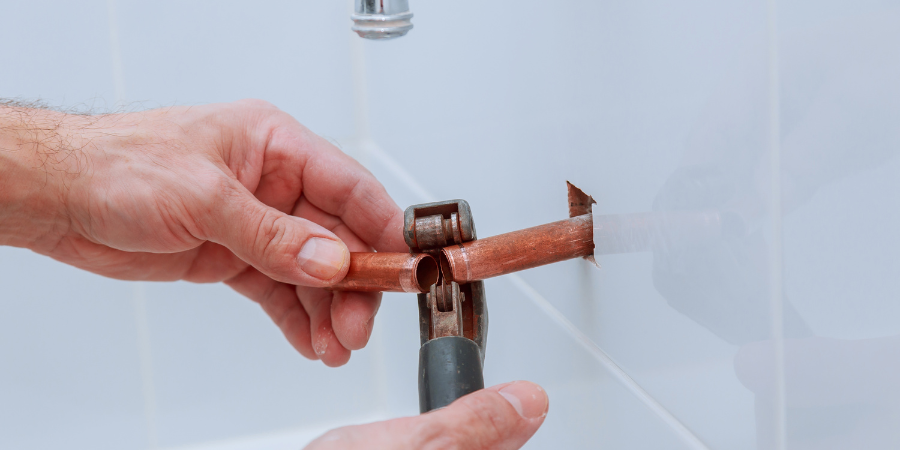Copper pipes have been used in residential and commercial plumbing for decades because they are lightweight, durable, flexible, and corrosion-resistant. Additionally, this type of piping can withstand extreme temperatures and pressures close to 1000 psi, making it one of the most popular choices today.
Although a superior performer, copper pipes are not problem-free; the main disadvantage of copper is its susceptibility to pinhole leaks. Pinhole leaks are small areas of deterioration on the internal surface of the pipe that lead to a breakthrough in the pipe wall.
In this article, we will examine the causes of pinhole leaks in copper pipes and look at the possible prevention methods and repair steps required to address pinhole leaks. We will then look at whether repairing the copper pipes or replacement of the entire plumbing system is needed.
Common Causes Of Pinhole Leaks
Several conditions lead to copper pipe developing pinhole leaks. Here we will look at the most common contributors.
High-Velocity Water
Plumbing codes stipulate that cold water travels at 8 feet/second while hot water travels at five feet/second. Any fluctuations in these speeds can cause premature wear and tear on pipe interiors leading to a portion of the pipe deteriorating more quickly.
Improper Installation
Water velocity can also be accelerated by improper installation of pipe fittings. Pipe fittings that are set too close together increase the turbulence of water, and as it hits the fittings, is forced up against the pipe walls breaking down the pipe material.
Poor installation can also be classified as a pipe that has been improperly cut and joined, leaving openings where water can escape. Pipes need to have clean edges and joints watertight, or increases in turbulence can occur leading to internal corrosion and pipe failure.
Pitting Corrosion
Although the definitive cause of pitting corrosion is unknown, it is believed that the reaction between the copper pipe and acidic water is the most common cause. Pitting corrosion is a localized form of corrosion where a small section of pipe fails and forms a small hole. Often these holes are so small the leak can go undetected for a long time resulting in hidden damages and costly repairs.
Chlorinated Water
All water entering residential and commercial properties has been treated with chlorine which acts to remove germs and pathogens, leaving behind safer drinking water. Although not harmful to humans, chlorinated water can ruin copper pipes by earring away at their interiors, leaving behind a pinhole leak.
Aging Plumbing Is Failing Plumbing
Copper pipe has a lifespan of about 50 years. If the plumbing in your property is nearing the end of its expected years, you may find you are calling frequently for pipe repairs. Again, it is important to realize pinhole leaks are sneaky and hard to detect, leading to rotting infrastructure and possible mold growth, which will adversely affect your health.
Preventing Pinhole Leaks
Luckily, there are simple steps that can be taken to reduce or even prevent pinhole leaks. Following this advice can extend the life of your copper pipes and reduce the possibility of hidden leaks and associated negative consequences.
Monitor Your Water Pressure
Checking the velocity of the water running through your pipes is important. Not only can this encourage corrosion, it can also lead to early wear and tear on pipe joints, plumbing fixtures, and water-using appliances and lead to premature replacement of them all.
Arraign For A Plumbing Inspection
A plumbing inspection can uncover a pinhole leak so prompt repairs can be made. An inspection will also identify if the copper pipes, along with all the plumbing, were installed properly. The earlier you find improperly installed plumbing the better your chances are of avoiding a plumbing disaster.
Water Filtration And Water Softening
Installation of a water filtration system or a softener will help balance the water and remove unwanted minerals, chemicals, and unwanted particles reacting to the copper pipe. Reducing the chlorine or removing hard water minerals such as calcium and magnesium will prolong the life of your copper pipes.
Is It Time To Repipe?
Copper pipes can be repaired. Small holes can be covered in solder, and short pipe sections can be replaced fairly easily. We would only recommend whole-home repiping if your plumbing pipes have reached or are nearing the end of their life expectancy and your calls for service have been frequent. A whole-home repiping is a major undertaking but, when needed, can be a cost-effective response to a failing system.
Call us today to evaluate your plumbing system so we can determine the state of your copper pipes. We know pinhole leaks can be annoying, but they can also waste water, increase your monthly utility bills, and create hidden damages that could require extensive and costly renovations. It is well worth the time and expenditure to put your mind at rest and know your copper pipes are in good shape and functioning properly!
Need an emergency plumber in Orange County? Contact us today!






